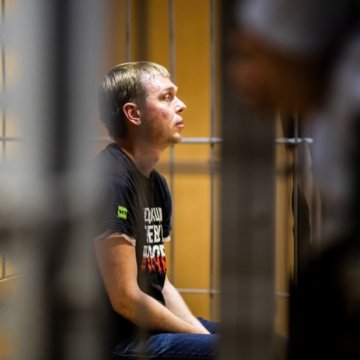- About
- Topics
- Picks
- Audio
- Story
- In-Depth
- Opinion
- News
- Donate
- Signup for our newsletterOur Editors' Best Picks.Send
Read, Debate: Engage.
When on June 6 a Moscow correspondent of the Riga-based Meduza newspaper was detained by police, it looked like just another repressive act of the Russian authorities against press freedom. Ivan Golunov was accused of illegal possession of drugs. Under article 228 of the Russian Criminal Code, he faced up to 20 years in prison.
The arrest caused massive public outcry in Russia with a media campaign launched immediately in support of the journalist, still few had actually believed Golunov would have any chance for a fair trial. Everyone in Russia knew very well that reporters who dare nose too deep into top officials' dirty affairs have no hope to win in court.
On June 8, Golunov was placed under house arrest pending police investigation. His colleagues and human rights activists were preparing for a long battle with the oppressive system. But three days later, the day before the Russia Day, the news stroke out of the blue: Golunov was cleared from all accusations and released. Moreover, Russian parliament, State Duma, announced that the anti-drug laws would be lightened shortly.
Despite the developments being positive, local experts warn against opening champaign in celebration, head of the New Drug Policy programme Lev Levinson says. He stresses that human rights activists should not believe the release of Ivan Golunov has been due to their efforts solely. "Understanding that the anti-drug law must be amended to render it less severe has been there already. The amendments have been circulating between the Interior Ministry, State Duma and other government agencies for three years. Public outcry over Golunov's arrest was just the last straw", Levinson says. He points out that in the last 20 years no drugs have ever been planted to make a piece of fake evidence against a reporter or human rights activist.
Still, some experts in anti-drug policy caution not to push the pendulum too far to the opposite direction. Head of the National Anti-Drug Union Nikita Lushnikov hopes the state officials and legislators won't toss the baby out with the bathwater. "We hope the officials in the Main anti-drug administration won't give a green light to drug dealers in the country with 8 million drug addicts registered and three times more hidden", he says. Lushnikov agrees that planting drugs is the beeline way to detain a person the police needs to detain. Still, if that practice is banned, police could easily find similarly illegal substitutions to abuse human rights in this country.
"There are plenty of other articles in the Russian Criminal Code to arrest a person on a whim. Police can plant rifle rounds as easily as drugs. So I don't think that lightening the anti-drug legislation would help human rights and press freedom here", he says. Lushnikov stresses that if a person's activity uncovers dirty linen of some high-ranking officials, that person could be accused of a score of tax violations, money laundering and other crimes. "The solution is not amending laws but making it impossible to use these laws as trick bags. The system as a whole must be amended, not its particulars".
According to the expert, the number of people arrested under article 228 on political pretext comprises a fraction of percent compared to the number of real drug dealers detained under the same article. "Leave the article 228 alone. Change the law enforcement system", he calls on.
Photo: Evgeny Feldman for Meduza
